Hollywood seems to understand our yearning to be reunited with loved ones and that, for many of us, death is not the end.Casper aside, we don’t typically think of ghosts as being all that friendly. Camp counselors don’t tell ghost stories around the fire to help their campers sleep better at night, after all. The ghosts of our popular imagination are usually scary, sometimes dangerous, and always dead.
The cinematic specters we see are typically no better. From the spooky spirits from 1963’s The Haunting to the ticked-off terrors in 1982’s Poltergeist to the terrifying presence in 2014’s The Babadook, ghosts are generally bad news.
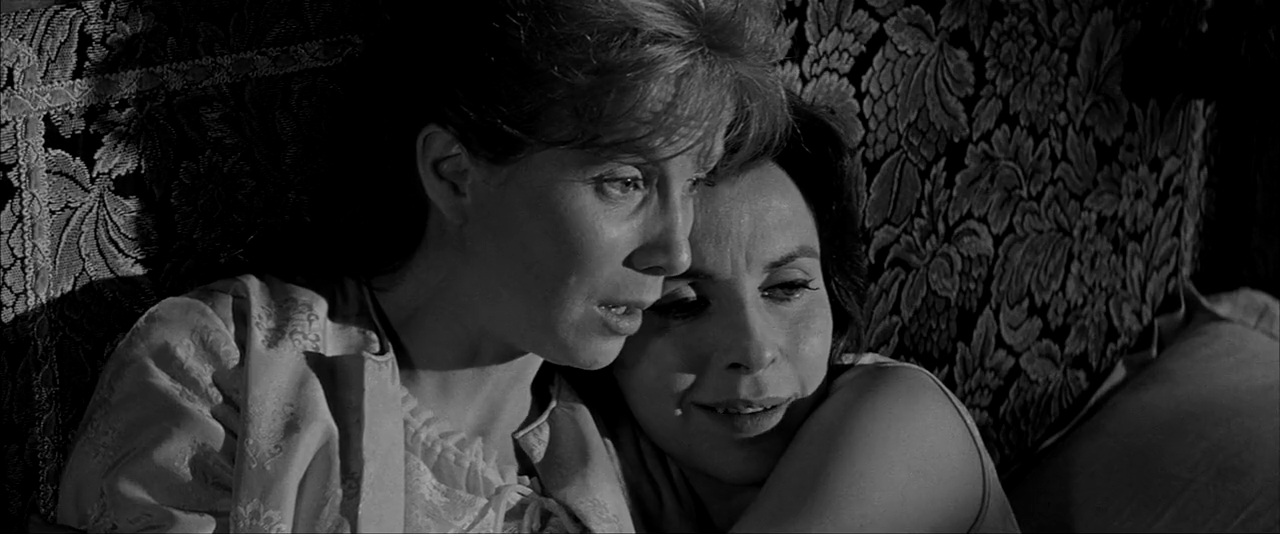
But that’s not always the case. In The Revenant, for example, the ghosts are about the most optimistic, most encouraging entities in the entire story.
Sometimes people come back — at least in the movies — with the very best of intentions. They want to help the hero in some way with a word of encouragement or a friendly nudge down the right path. Sure, there are times when these well-meaning spirits can be frightening, but often they’re figures of comfort — a welcome presence in times of incredible stress. They’re almost always close to the person they’re haunting — a dear friend, a cherished relation. Sometimes it’s hard to tell whether they’re ghosts at all, visiting in dreams or visions or in deeply reflective moments.
It’s interesting that Hollywood comes back to these friendly ghosts time after time. Filmmakers seem to understand how important our family members and friends are, even when they’ve been gone for a while. They get our yearning to be reunited with them — to feel their hand in our lives even beyond the grave. Perhaps it’s even an acknowledgement that, for most of us, death is not the end — the soul lives on. And we will see each other again.
These ghosts are certainly not sequestered to horror movies. They can be found in box-office blockbusters, critical darlings or even in kids’ movies. Read on below, if you dare, and enter the strange, surprisingly sweet world where the living and dead intermingle and no one seems to mind.
Note: Some spoilers below!
The Revenant (2015)
Hugh Glass (Leonardo DiCaprio) is, it would seem, utterly alone. His wife died years earlier. His only son was killed before his eyes. His friends and comrades deserted him, leaving him to the mercies of weather and wilderness. And yet even on this solitary journey of survival, Glass finds mysterious company — company that sometimes he alone can see. During an incredibly lucid fever dream, Glass finds himself in a ruined church, the bell swinging mutely as he greets his dead son in the rubble. Throughout his journey, Glass sees his dead wife in visions: she exhorts him to move on — to survive, no matter how hard it might be.
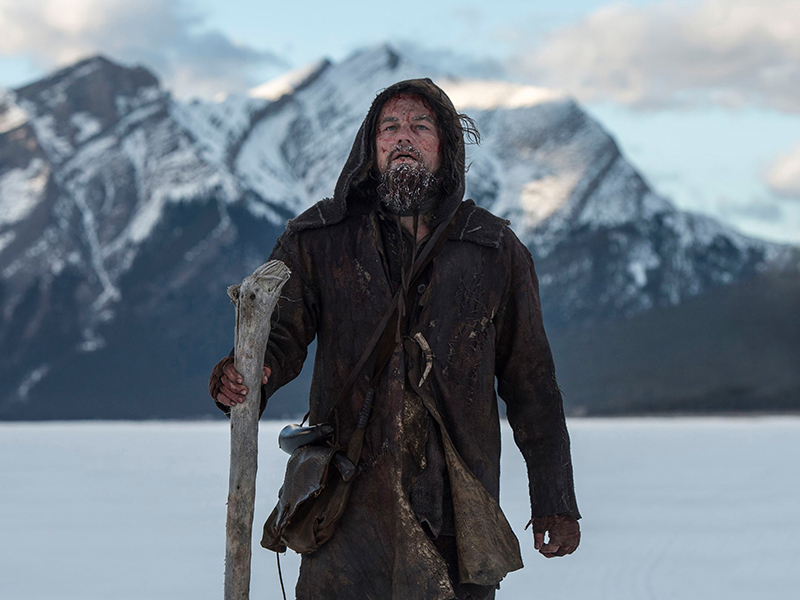
“As long as you can still grab a breath, you fight,” she tells him. “You breathe. Keep breathing. When there is a storm and you stand in front of a tree, if you look at its branches, you swear it will fall. But if you watch the trunk, you will see its stability.”
Hugh Glass listens and obeys. Spirits from his own fractured past push him to survive and rebuild — no easy task.
Joy (2015)
For years, Joy Mangano (Jennifer Lawrence) struggled with what to do with her life. Her marriage failed. Her jobs were unfulfilling. Her demanding family sapped so much of her strength that she’s practically a ghost herself. Only one person ever seemed to believe in her — “Mimi,” her beloved grandmother, who always told Joy that she was beautiful and brilliant and that she could do whatever she wanted.
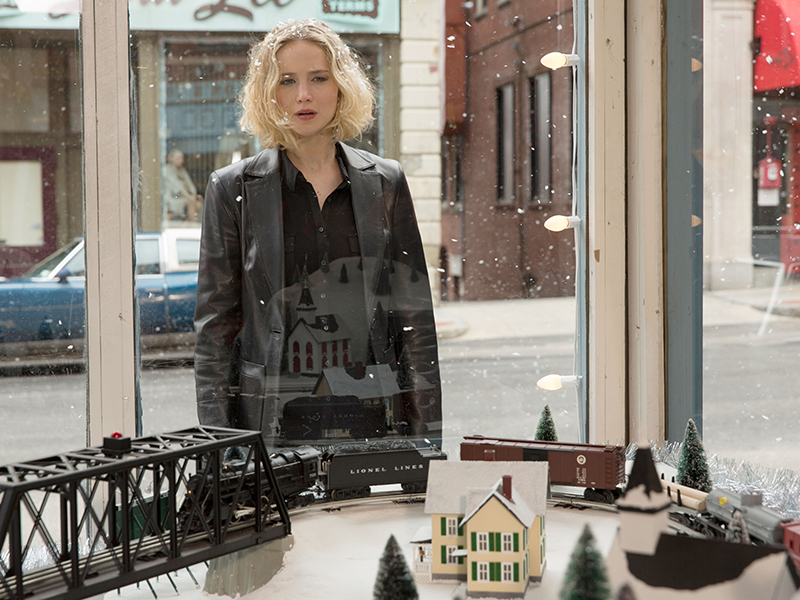
Mimi’s words felt empty for years … until Joy rediscovers her love of invention and creates a self-wringing mop, which she successfully markets on the upstart QVC cable shopping network. Just when Joy is on the cusp of all the success that Mimi knew she was capable of, Mimi dies. Joy is heartbroken. And yet at the funeral, a grieving Joy feels a strange touch. She looks up and sees her grandmother smiling tenderly at her. It’s as if Mimi took one final moment to tell Joy that she’s still beautiful and brilliant, and that she’ll never be alone.
Field of Dreams (1989)
“If you build it, he will come.” That’s what a mysterious voice tells farmer Ray Kinsella (Kevin Costner) as he walks through one of his cornfields. Before long, and against all common sense, Ray has built himself a baseball diamond in the middle of his cash crop. And that’s when things get weird.
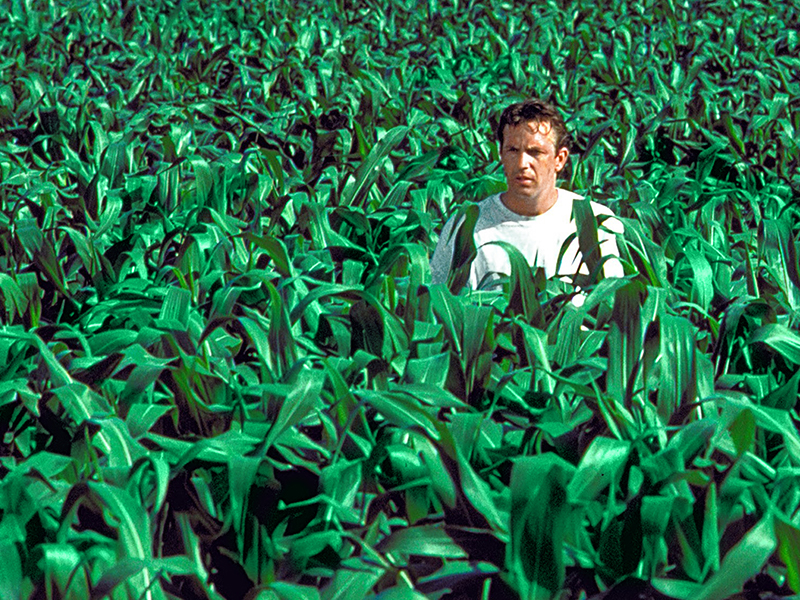
First, Shoeless Joe Jackson (Ray Liotta) shows up — a scandalized White Sox star idolized by Ray’s long-dead father. Soon, the field is (ahem) alive with ghosts from the past, playing the game they loved and missed. Even as the Kinsella family sinks deeper into debt, miracles continue to grow on this fallow field. And then one day as the sun sinks to twilight, Shoeless Joe repeats those eerie, disembodied words to Ray: “If you build it, he will come.” Joe points to a spectral catcher, just taking off his mask to reveal himself as Ray’s father — young, vibrant, full of life, so different from the broken-down man that Ray grew up with and grew apart from. As the light of the day dwindles, Ray asks, “You wanna have a catch?” And they do.
Batman vs. Superman (2016)
While Clark Kent grew up on a small farm in Kansas, his father (Kevin Costner) instilled his remarkable adoptive son with solid, bedrock values — values Supes has always tried to follow. But even though Superman has become a good man, some people aren’t so sure this all-powerful alien is all he’s cracked up to be. Superman, hurt and wondering if he’s doing more harm than good, considers retreating from the world forever, locking himself away in his icy Fortress of Solitude.
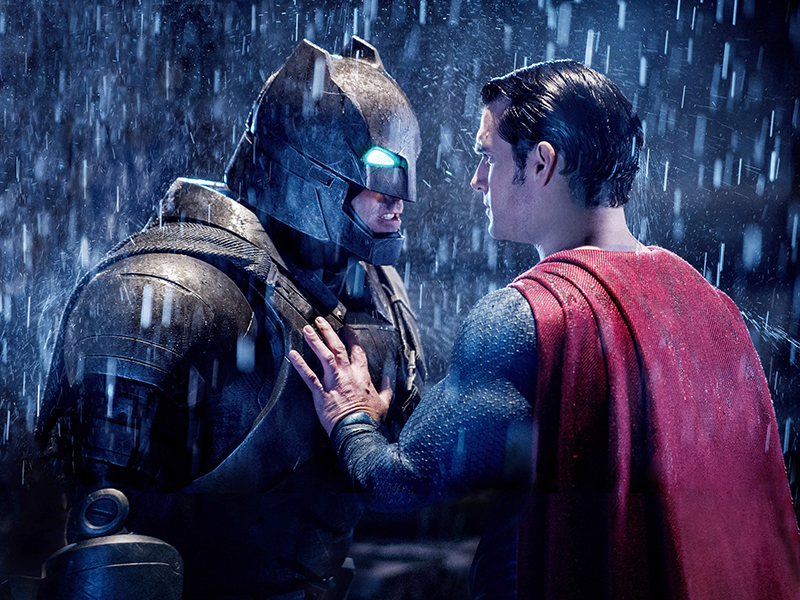
But who should be there when Superman arrives? His father, even though he’s been dead for years. Pops tells his son a story of how, as a young man, he helped save his farm from a flood — only to learn later that the flood waters killed a bunch of horses at a nearby farm downstream. The somber moral is that good deeds sometimes spawn bad consequences. It’s inevitable and it’s sad … but it doesn’t make those deeds wrong.
The Lion King (1994)
Ever since King Mufasa was killed in that unfortunate stampede, things have been rough for his son Simba. The poor cub blamed himself for the accident and he ran off into the wilds, primarily hanging out with two critters whom he’d normally eat for breakfast.

But Mufasa’s old pride lands, bereft of a real king, have fallen on hard times since Simba took off. And now, it’s up to Mufasa to return from the grave — appearing as a somber cloud in the sky — and coax Simba to return. “You have forgotten who you are and so have forgotten me,” Mufasa’s ghost says. “Look inside yourself, Simba. You are more than what you have become.” It’s clear the time has come for Simba to return to the pride lands and take his rightful place in the circle of life — and he does it because his father’s ghost tells him to.
Ghost Town (2008)
You’d think that Dr. Pincus (Ricky Gervais) would never have to worry about friendly ghosts haunting him. Heck, so few people liked him when they were alive, why would they bother with him after death? But when Pincus has a near-death experience himself while undergoing a routine operation, the ghosts come a-calling, thrilled he’s able to see them. Seems as though the dead have a lot of unfinished business with their living loved ones, and they turn to Pincus to help tie up loose ends. Turns out, it’s the only way they’ll get to heaven.
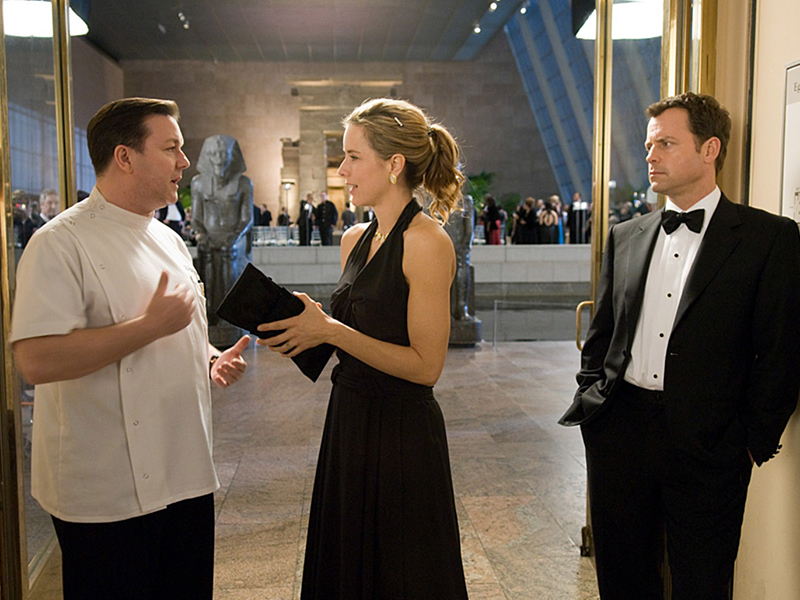
Frank (Greg Kinnear) is Pincus’ chief poltergeist pest, eager to keep his newly widowed wife, Gwen, from marrying again. But as Pincus slowly falls in love with Gwen — and she, in a curious way, with him — Frank realizes that it’s better to help bring them together, not keep them apart.
A Christmas Carol (1951, among many others)
Jacob Marley (Michael Hordern), Charles Dickens tells us, was as dead as a coffin nail. No doubt about it. But that didn’t stop him from re-visiting the mortal plane, chains and all, to help his former business associate, Ebenezer Scrooge (Alastair Sim), avoid an afterlife of eternal torment. “What do you want from me?” Scrooge asks him. “Much,” Marley answers. Not an encouraging start to this visit from beyond.
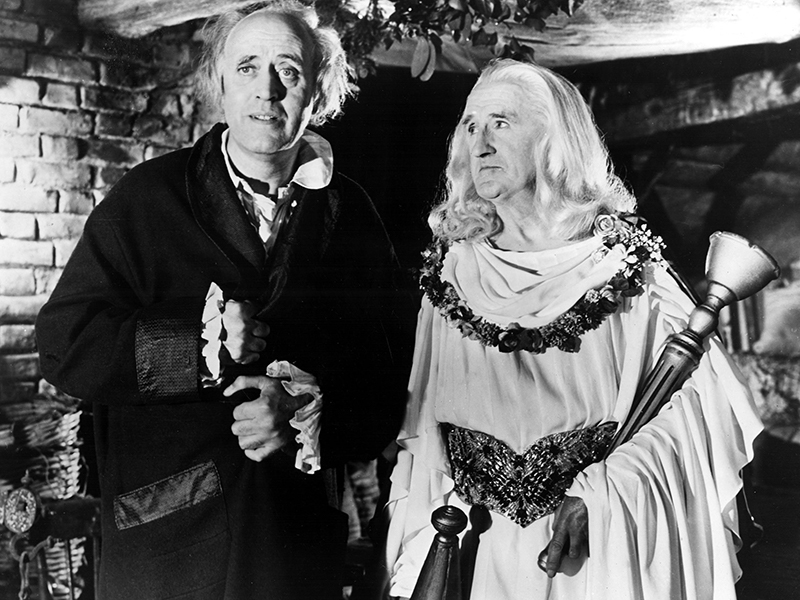
But even though Marley isn’t exactly a welcome visitor, he is very much needed. Indeed, Scrooge is visited by a whole cadre of well-meaning ghosts, each bringing him important messages of reflection, encouragement, and warning. There’s a reason why A Christmas Carol has undergone more remakes than Madonna: the story is ultimately one of hope, goodwill and, most importantly, redemption — and Scrooge owes his new life to visitors who long ago lost their own.
The Ghost and Mrs. Muir (1947)
It’s rare for ghosts to meet the acquaintance of their favorite haunts after they’re dead. But that’s pretty much what happens in this curious supernatural romance. Recently widowed Lucy Muir (Gene Tierney) moves into a quaint English cottage with her young daughter, Anna — only to discover someone (or something) is already living there. And the cantankerous ghostly resident, Captain Daniel Gregg (Rex Harrison), doesn’t initially care much for Gull Cottage’s new inhabitants.
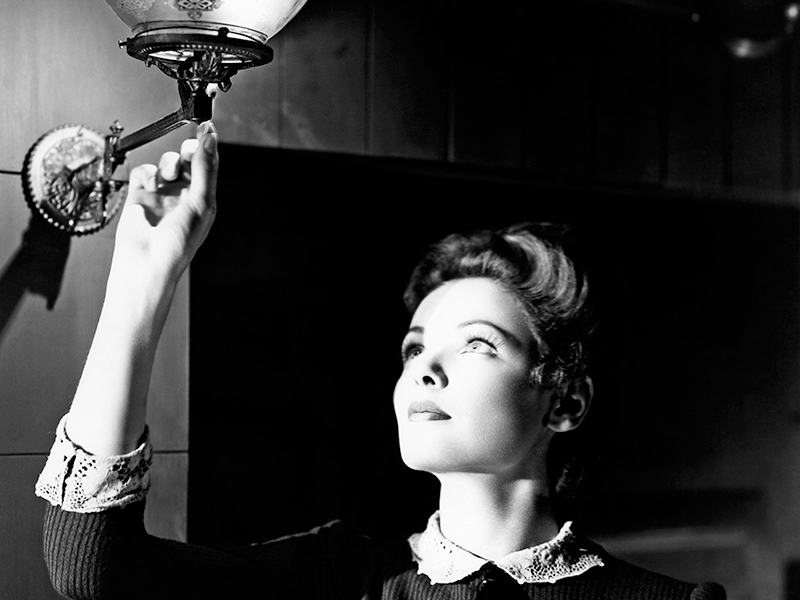
Eventually, the two come to an understanding. And when Captain Gregg realizes that poor, cash-strapped Lucy might lose the cottage, he decides to dictate his memoirs to her. She turns it into a book which, after much turmoil, becomes a smashing success. The cottage is saved and Lucy spends the rest of her life there — until she herself dies, joining Captain Gregg in the afterlife.
Interstellar (2014)
Christopher Nolan’s brain-bending science fiction flick kicks off with a ghost — a poltergeist apparently haunting the room of a young girl named Murphy. When her father, Cooper, finally sees this supposed spirit in action, he realizes that whatever it is, it’s trying to communicate with them — with gravity.
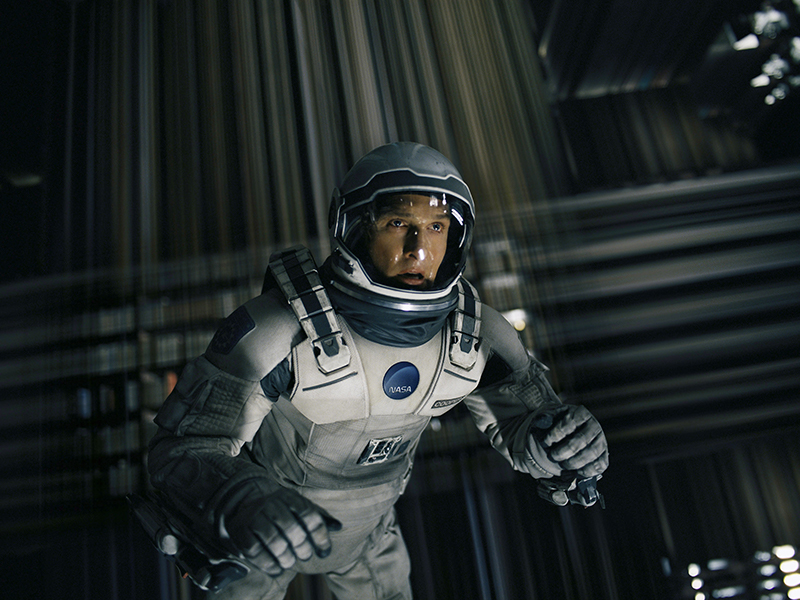
The message takes them to a mysterious locale in the middle of nowhere, where Cooper learns the earth is dying. A former pilot, Cooper is asked to take a handful of scientists to see if they can find a new home for earth’s fading remnants. But in spite of a spectral intelligence pointing the way, it’s not as easy as it looks. The space-time continuum spins out of control, and by the end, Cooper is being sucked backwards in time — into, of all things, what looks like a galactic library. And what should he see through the space between books? His daughter’s room … from decades ago. He is the ghost that haunted Murphy’s bedroom — and he dutifully leaves a gravitational message that Cooper himself can follow.

Read more:
A life of sacrifice: Movies about Mother Teresa and other real-life heroes








